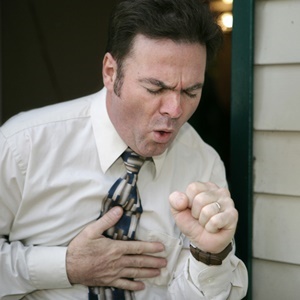
Heart attacks are the number one killer of South African men, according to a previous Health24 report. And with 6.3 million people living with high blood pressure, South Africa also has one of the highest rates of hypertension worldwide.
With these disturbing numbers in mind, it’s important to know what to do when someone suffers a heart attack.
Recently rumours have emerged that coughing may help victims during a heart attack. But how true is this?
'Cough CPR'
Myocardial infarction (MI), commonly known as a heart attack, is the irreversible death (necrosis) of the heart muscle when the blood flow and oxygen to any part of the heart is interrupted or blocked (ischaemia).
“There has been recent talk on the Internet about 'cough CPR' which describes the act of vigorously coughing at the onset of a heart attack to help prevent the heart attack from occurring and maintaining blood flow back to the heart,” said Dr Zakariyya Patel of Pelonomi Hospital Complex in Bloemfontein.
Many leading authorities, including the American Heart Foundation and the British Heart Foundation, do not endorse this method of dealing with a heart attack, said Dr Patel.
“Cough CPR is, however, used in a Catherterisation Laboratory where trained medical personnel work with a conscious responsive patient.”
“But even this has a limited use under certain conditions,” Patel added.
The warning signs
Before a heart attack occurs, there may be possible warning signs.
The earliest symptoms of a heart attack include:
- Chest pain that can spread to the neck, jaw, shoulder and left arm (described as a crushing, burning or sharp pain)
- Nausea and vomiting
- Heartburn or indigestion-like symptoms
- Dizziness or lightheadedness
- Fast or irregular heart rate (tachycardia) if severe enough
- Fast or irregular breathing (tachypnoea)
“These symptoms become more concerning in a person with diabetes, hypertension, cholesterol or a history of smoking,” Patel added.
What you should do
A heart attack is a medical emergency, and you should call the nearest emergency services (EMS) immediately.
EMS personnel are trained to begin life-saving treatment as soon as they arrive and make contact with the victim at the scene of the heart attack, said Patel.
“But if you have trouble accessing EMS, the next option would be to head to the nearest medical centre or doctor as soon as possible for diagnosis and assistance.”
In most cases, an electrocardiogram (ECG) and blood tests may be required to exclude the diagnosis of a heart attack.
“But in a situation as dire as a heart attack – where every second counts – a person wasting effort on a potentially futile procedure (cough CPR) means precious time lost in getting proper medical treatment,” said Patel.
The sooner the victim gets help, the less chance of developing further complications.
Emergency numbers:
- All medical emergencies: 10177/112 (from a cellphone)
- Netcare: 082 911
- ER24: 084 124
Read more:
45 percent of heart attacks are 'silent'




 Publications
Publications
 Partners
Partners











